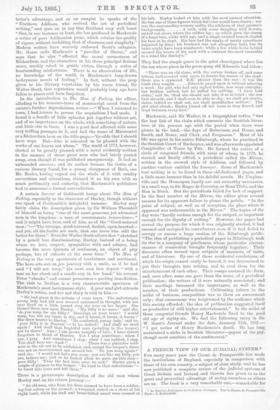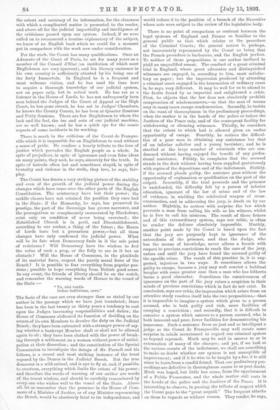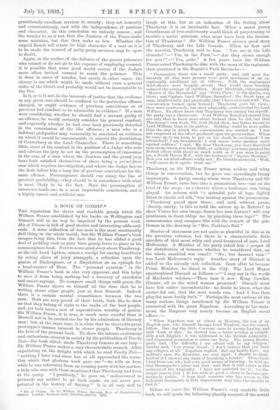A FRENCH VIEW OF OUR JUDICIAL SYSTEM.* FOR many years
past the Count de Franquevillo has made the institutions of England, especially in comparison with those of his own country, a subject of close study, and he has now published a complete review of the judicial systems of Great Britain and Ireland, and therein has given to us the great and proverbial advantage of seeing ourselves as others see us. The book is a very remarkable one,—remarkable for * Le SysUme Judiciaire do is Granule Bretagne. Par lo Comte de Franquovillea Paris : J. Rotheahild.
the extent and accuracy of its information, for the clearness with which a complicated matter is presented to the reader, and above all for the judicial impartiality and intelligence of the criticisms passed upon our system. Indeed, if we were called on to recommend a treatise explanatory of the subject, we know of no English book which we could for a moment put in comparison with the work now under consideration.
For the work, the Count has many qualifications. Once an Advocate of the Court of Paris, he sat for many years as a member of the Conseil d'Etat (an institution of which most Englishmen are very ignorant), and his literary eminence in his own country is sufficiently attested by his being one of the forty Immortals. In England he is a frequent and most welcome visitor, and he has used his time here to acquire a thorough knowledge of our judicial system, not on paper only, but in actual work. He has sat as a listener in the House of Lords, he has not unfrequently been seen behind the Judges of the Court of Appeal or the High Court, he has gone circuit, he has sat in Judges' Chambers, he knows the County Courts, he has been at Quarter Sessions and Petty Sessions. There are few Englishmen to whom the look and the feel, the ins and outs of our judicial machine, are so well known ; and he has a quick eye for the comic aspects of some incidents in its working.
There is much in the criticism of the Count de Franque- ville which it is impossible for an Englishman to read without a sense of pride. He renders a hearty tribute to the love of justice which pervades the English people as a whole. In spite of prejudices, in spite of ignorance and even false ideas on many points, they seek, he says, sincerely for the truth. In spite of hatreds often hot and sometimes stupid, in spite of brutality and violence in the strife, they love, he says, fair- play.
The Count has drawn a very striking picture of the stability and even of the growth of the judicial power during the changes which have come over the other parts of the English Constitution. The aristocracy have lost their power; the middle classes have not retained the position they once had in the State ; if the Monarchy, he says, has preserved its prestige, the part of the Sovereign has grown narrower, and the prerogatives so complacently enumerated by Blackstone, exist only on condition of never being exercised ; the Established Church is in peril, and Disestablishment, according to our author, a thing of the future ; the House of Lords have but a precarious power,—but all these changes have only confirmed the judicial power. What will be its fate when Democracy finds in it the sole point of resistance P Will Democracy have the wisdom to feel the value of such a prop, or the folly to see in it but an obstacle ? Will the House of Commons, in the plenitude of its material force, respect the purely moral force of the Bench P It is possible to fear everything from popular pas- sions ; possible to hope everything from British good sense. In any event, the friends of liberty should be on the watch, and remember the warning words of Horace to the vessel of the State :— "Tu, nisi ventis Debos ludibrium, cave."
The facts of the case are even stronger than as stated by our author in the passage which we have just translated ; there has been in the last twenty or thirty years a tendency to east upon the Judges increasing responsibilities and duties ; the House of Commons abdicated its function of deciding on the return of its own Members to devolve the duty on the Judicial Bench ; they have been entrusted with a stranger power of say- ing whether a bankrupt Member shall or shall not be allowed again to sit ; they have been clothed with the power of break- ing through a settlement on a woman without power of antici- pation at their discretion ; and the constitution of the Special Commission to investigate the doings of Mr. Parnell and his fellows, is a recent and most striking instance of the trust reposed by the Demos in the Judicial Bench. But the true democrat is a wild animal, and is apt to fly at, and, if possible, to overturn, everything which limits the extent of his power ; and therefore the words of warning of our author are words of the truest wisdom, and should be carefully remembered by every one who wishes well to the vessel of the State. Above all, let us remember that the presence in the House of Com- mons of a Minister of Justice, or of any Minister representing the Bench, would be absolutely fatal to its independence, and would reduce it to the position of a branch of the Executive whose acts were subject to the review of the legislative body.
There is no point of comparison or contrast between the legal systems of England and France so familiar to the general public as that which relates to the procedure of the Criminal Courts ; the general notion is, perhaps, not inaccurately represented by the Count as being that the French procedure is barbarous, and the English perfect. To neither of these propositions is our author inclined to yield an unqualified assent. The conduct of a groat criminal trial in England, where great advocates and distinguished witnesses are engaged, is, according to him, most satisfac- tory on paper ; but the impression produced by attending a criminal court engaged in the transaction of ordinary cases is, he says, very different. It may be well for us to attend to the faults found by so impartial and enlightened a critic. First, he objects that the law does not absolutely prohibit compromises of misdemeanours,—so that the man of means may in many cases escape condemnation. Secondly, he insists on the want of thoroughness in the preliminary proceedings, when the matter is in the hands of the police or before the Justices of the Peace only, and of the consequent facility for withdrawing or silencing witnesses. Thirdly, he considers that the extent to which bail is allowed gives an undue opportunity of escape. Fourthly, he notices the difficul- ties of a poor man in obtaining any assistance but that of an inferior solicitor and a young barrister ; and he is startled at the large number of criminals who are con- demned without having enjoyed the benefit of any profes- sional assistance. Fifthly, he complains that the accused stands in the dock without having been supplied gratuitously with copies of the depositions and of the indictment. Sixthly, if the accused pleads guilty, the sentence goes without the opportunity of explanation or qualification on the part of the culprit. Seventhly, if the trial proceeds and the prisoner is undefended, the difficulty felt by a person of inferior education, ignorant of the law of Grime and of the law of evidence, in wielding the celebrated weapon of cross- examination, and in addressing the jury, is dwelt on by our author. Eighthly, he notices with surprise the law which prevents a man from calling his wife as his witness, whilst he is free to call his mistress. The result of these fetters and of this extraordinary system, says our critic, is often to render the defence absolutely impossible. Ninthly, another point made by the Count is based upon the fact that the jury are purposely kept in ignorance of the antecedents of the prisoner, and that the Judge, who has the means of knowledge, never allows a breath with respect to previous convictions to reach the ears of the jury, unless and until the jury have found the accused guilty of the specific crime. The result of this practice is, it is sug- gested, injurious in two ways. It sometimes allows the guilty to escape, because a jury may well convict a habitual burglar with some greater ease than a man who has hitherto borne a good character. Sometimes the consciousness of ignorance on the part of the jury raises a suspicion in their minds of previous convictions which in fact do not exist. In conclusion, says our critic, the impression which arises from an attentive study resolves itself into the two propositions,—that it is impossible to imagine a system which gives to a person accused, who is both guilty and rich, more facilities of escaping a conviction ; and secondly, that it is difficult to conceive a system which assures to a person accused, who is both innocent and poor, fewer facilities for demonstrating his innocence. Such a sentence from so just and so intelligent a judge as the Count de Franqueville may well create some surprise in minds accustomed to regard our criminal system as beyond reproach. Much may be said in answer to or in extenuation of many of the charges ; and yet, if we look at the various counts of the indictment, we shall see something to make us doubt whether our system is not susceptible of improvement; and if it be wise to be taught by a foe, it is still wiser to leain from a candid friend. That our preliminary pro- ceedings are defective in thoroughness seems to us past doubt. Much was hoped, but little has come, from the appointment of a Public Prosecutor, and the whole matter still rests in the hands of the police and the Justices of the Peace. It is interesting to observe, in passing, the tribute of respect which the Count pays to the "great unpaid." The frequent attacks on them he regards as without reason. They render, he says,
gratuitously excellent services to society ; they act honestly and conscientiously, and with the independence of position and character. In this conclusion we entirely concur; and the wonder to us is not that the Justices of the Peace make some mistakes, but that they make so few. Whether the unpaid Bench will retain its high character if a seat on it is to be made the reward of petty party services, may be open to doubt.
Again, in the matter of the defence of the poorer prisoners who cannot or do not go to the expense of employing counsel, it is possible that some good would accrue if the Judges more often invited counsel to assist the prisoner. This is done in cases of murder, but rarely in other cases ; the change is one which might be made without even a general order of the Court, and probably would not be inacoeptable to the Bar.
Is it, or is it not, in the interests of justice that the evidence in any given case should be confined to the particular offence charged, or ought evidence of previous convictions or of previous bad conduct to be admissible in evidence P If a man were considering whether he should find a servant guilty of an offence, he would certainly consider his general conduct, and especially whether he had ever been previously detected in the commission of the like offences ; a man who is a habitual pickpocket may reasonably be convicted on evidence on which it would be unreasonable to convict the Archbishop of Canterbury or the Lord Chancellor. There is something little short of the comical in the position of a Judge who acts and advises the jury to act on the presumption of innocence in the case of a man where the Justices and the grand jury have both satisfied themselves of there being a prima-facie ease which requires investigation, and where the Judge has on the desk before him a long list of previous convictions for the same offence. Presumptions should run along the line of greatest probability,—they should be in accordance with what is most likely to be the fact. Here the presumption of innocence lands one in a most improbable conclusion, and is a highly unreal and artificial one.




































 Previous page
Previous page